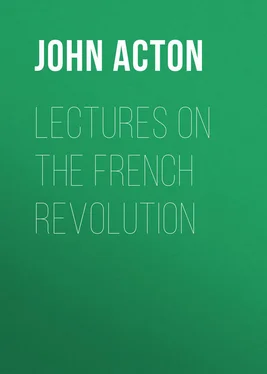John Acton - Lectures on the French Revolution
Здесь есть возможность читать онлайн «John Acton - Lectures on the French Revolution» — ознакомительный отрывок электронной книги совершенно бесплатно, а после прочтения отрывка купить полную версию. В некоторых случаях можно слушать аудио, скачать через торрент в формате fb2 и присутствует краткое содержание. Жанр: foreign_antique, foreign_prose, Историческая проза, на английском языке. Описание произведения, (предисловие) а так же отзывы посетителей доступны на портале библиотеки ЛибКат.
- Название:Lectures on the French Revolution
- Автор:
- Жанр:
- Год:неизвестен
- ISBN:нет данных
- Рейтинг книги:4 / 5. Голосов: 1
-
Избранное:Добавить в избранное
- Отзывы:
-
Ваша оценка:
- 80
- 1
- 2
- 3
- 4
- 5
Lectures on the French Revolution: краткое содержание, описание и аннотация
Предлагаем к чтению аннотацию, описание, краткое содержание или предисловие (зависит от того, что написал сам автор книги «Lectures on the French Revolution»). Если вы не нашли необходимую информацию о книге — напишите в комментариях, мы постараемся отыскать её.
Lectures on the French Revolution — читать онлайн ознакомительный отрывок
Ниже представлен текст книги, разбитый по страницам. Система сохранения места последней прочитанной страницы, позволяет с удобством читать онлайн бесплатно книгу «Lectures on the French Revolution», без необходимости каждый раз заново искать на чём Вы остановились. Поставьте закладку, и сможете в любой момент перейти на страницу, на которой закончили чтение.
Интервал:
Закладка:
"The great inlet by which a colour for oppression has entered into the world is by one man's pretending to determine concerning the happiness of another. I would give a full civil protection, in which I include an immunity from all disturbance of their public religious worship, and a power of teaching in schools as well as temples, to Jews, Mahometans, and even Pagans. The Christian religion itself arose without establishment, it arose even without toleration, and whilst its own principles were not tolerated, it conquered all the powers of darkness, it conquered all the powers of the world. The moment it began to depart from these principles, it converted the establishment into tyranny, it subverted its foundation from that very hour. It is the power of government to prevent much evil; it can do very little positive good in this, or perhaps in anything else. It is not only so of the State and statesman, but of all the classes and descriptions of the rich: they are the pensioners of the poor, and are maintained by their superfluity. They are under an absolute, hereditary, and indefeasible dependence on those who labour and are miscalled the poor. That class of dependent pensioners called the rich is so extremely small, that if all their throats were cut, and a distribution made of all they consume in a year, it would not give a bit of bread and cheese for one night's supper to those who labour, and who in reality feed both the pensioners and themselves. It is not in breaking the laws of commerce, which are the laws of nature and consequently the laws of God, that we are to place our hope of softening the divine displeasure. It is the law of nature, which is the law of God."
I cannot resist the inference from these passages that Burke, after 1770, underwent other influences than those of his reputed masters, the Whigs of 1688. And if we find that strain of unwonted thought in a man who afterwards gilded the old order of things and wavered as to toleration and the slave trade, we may expect that the same causes would operate in France.
When the Letters of a Pennsylvanian Farmer became known in Europe, Diderot said that it was madness to allow Frenchmen to read such things, as they could not do it without becoming intoxicated and changed into different men. But France was impressed by the event more than by the literature that accompanied it. America had made herself independent under less provocation than had ever been a motive of revolt, and the French Government had acknowledged that her cause was righteous and had gone to war for it. If the king was right in America, he was utterly wrong at home, and if the Americans acted rightly, the argument was stronger, the cause was a hundredfold better, in France itself. All that justified their independence condemned the Government of their French allies. By the principle that taxation without representation is robbery, there was no authority so illegitimate as that of Lewis XVI. The force of that demonstration was irresistible, and it produced its effect where the example of England failed. The English doctrine was repelled at the very earliest stage of the Revolution, and the American was adopted. What the French took from the Americans was their theory of revolution, not their theory of government – their cutting, not their sewing. Many French nobles served in the war, and came home republicans and even democrats by conviction. It was America that converted the aristocracy to the reforming policy, and gave leaders to the Revolution. "The American Revolution," says Washington, "or the peculiar light of the age, seems to have opened the eyes of almost every nation in Europe, and a spirit of equal liberty appears fast to be gaining ground everywhere." When the French officers were leaving, Cooper, of Boston, addressed them in the language of warning: "Do not let your hopes be inflamed by our triumphs on this virgin soil. You will carry our sentiments with you, but if you try to plant them in a country that has been corrupt for centuries, you will encounter obstacles more formidable than ours. Our liberty has been won with blood; you will have to shed it in torrents before liberty can take root in the old world." Adams, after he had been President of the United States, bitterly regretted the Revolution which made them independent, because it had given the example to the French; although he also believed that they had not a single principle in common.
Nothing, on the contrary, is more certain than that American principles profoundly influenced France, and determined the course of the Revolution. It is from America that Lafayette derived the saying that created a commotion at the time, that resistance is the most sacred of duties. There also was the theory that political power comes from those over whom it is exercised, and depends upon their will; that every authority not so constituted is illegitimate and precarious; that the past is more a warning than an example; that the earth belongs to those who are upon it, not to those who are underneath. These are characteristics common to both Revolutions.
At one time also the French adopted and acclaimed the American notion that the end of government is liberty, not happiness, or prosperity, or power, or the preservation of an historic inheritance, or the adaptation of national law to national character, or the progress of enlightenment and the promotion of virtue; that the private individual should not feel the pressure of public authority, and should direct his life by the influences that are within him, not around him.
And there was another political doctrine which the Americans transmitted to the French. In old colonial days the executive and the judicial powers were derived from a foreign source, and the common purpose was to diminish them. The assemblies were popular in origin and character, and everything that added to their power seemed to add security to rights. James Wilson, one of the authors and commentators of the constitution, informs us that "at the Revolution the same fond predilection, and the same jealous dislike, existed and prevailed. The executive, and the judicial as well as the legislative authority, was now the child of the people, but to the two former the people behaved like stepmothers. The legislature was still discriminated by excessive partiality." This preference, historic but irrational, led up naturally to a single chamber. The people of America and their delegates in Congress were of opinion that a single Assembly was every way adequate to the management of their federal concerns, and when the Senate was invented, Franklin strongly objected. "As to the two chambers," he wrote, "I am of your opinion that one alone would be better; but, my dear friend, nothing in human affairs and schemes is perfect, and perhaps this is the case of our opinions."
Alexander Hamilton was the ablest as well as the most conservative of the American statesmen. He longed for monarchy, and he desired to establish a national government and to annihilate state rights. The American spirit, as it penetrated France, cannot well be described better than it was by him: "I consider civil liberty, in a genuine, unadulterated sense, as the greatest of terrestrial blessings. I am convinced that the whole human race is entitled to it, and that it can be wrested from no part of them without the blackest and most aggravated guilt. The sacred rights of mankind are not to be rummaged for among old parchments or musty records. They are written, as with a sunbeam, in the whole volume of human nature, by the hand of the Divinity itself, and can never be erased or obscured by mortal power."
But when we speak in the gross of the American Revolution we combine different and discordant things. From the first agitation in 1761 to the Declaration of Independence, and then to the end of the war in 1782, the Americans were aggressive, violent in their language, fond of abstractions, prolific of doctrines universally applicable and universally destructive. It is the ideas of those earlier days that roused the attention of France, and were imported by Lafayette, Noailles, Lameth, and the leaders of the future revolution who had beheld the lowering of the British flag at Yorktown. The America of their experience was the America of James Otis, of Jefferson, of The Rights of Man .
Читать дальшеИнтервал:
Закладка:
Похожие книги на «Lectures on the French Revolution»
Представляем Вашему вниманию похожие книги на «Lectures on the French Revolution» списком для выбора. Мы отобрали схожую по названию и смыслу литературу в надежде предоставить читателям больше вариантов отыскать новые, интересные, ещё непрочитанные произведения.
Обсуждение, отзывы о книге «Lectures on the French Revolution» и просто собственные мнения читателей. Оставьте ваши комментарии, напишите, что Вы думаете о произведении, его смысле или главных героях. Укажите что конкретно понравилось, а что нет, и почему Вы так считаете.












